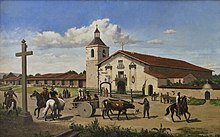The Tamien people (also spelled as Tamyen, Thamien) are one of eight linguistic divisions of the Ohlone (Costanoan) people groups of Native Americans who live in Northern California.[2] The Tamien traditionally lived throughout the Santa Clara Valley.[3] The use of the name Tamien is on record as early as 1777; it comes from the Ohlone name for the location of the first Mission Santa Clara (Mission Santa Clara de Tamine) on the Guadalupe River. Father Pena mentioned in a letter to Junipero Serra that the area around the mission was called Thamien by the native people.[4][5] The missionary fathers erected the mission on January 17, 1777, at the native village of So-co-is-u-ka.[6]
 Map of historical Tamyen territory | |
| Regions with significant populations | |
|---|---|
| Santa Clara Valley, California | |
| Languages | |
| Tamyen language |


In 1925, Alfred Kroeber, then director of the Hearst Museum of Anthropology, declared the Ohlone extinct, which directly led to the tribe losing federal recognition and land rights.[7]
Language
editTraditionally, the Tamien people spoke the Tamien language, a Northern Ohlone language, which ceased to be spoken since possibly the early 19th century. "Tamyen", also called Santa Clara Costanoan, has been extended to mean the Native people of Santa Clara Valley, as well as the language they spoke. Tamien is listed as one of eight Costanoan language dialects in the Utian family, although the cogency of the Utian language grouping (combining Miwokan with Ohione) is contested.[8] Tamien was the primary language of the Native people living at the first and second Mission Santa Clara (both founded in 1777). Linguistically, it is thought that Chochenyo, Tamyen and Ramaytush are dialects of a single language. However, this has not been proven and Chochenyo, Tamien, and Ramaytush remain separate political tribes.
Territory
editTamien territory extends over most of the present day Santa Clara County, California, and was bordered by communities that spoke other Ohlone languages: Ramaytush to the northwest on the San Francisco Peninsula, Chochenyo, East Bay, Mutsun, south of San Martin, and the Akwaswas to the southwest. Tamien villages were not "tribelets" but a Nation of Tamien speaking villages.
Tribes and villages
editThe Tamyen (Tamien, Thamien) people are associated with the original site of Mission Santa Clara (Mission Santa Clara de Thamien) on the Guadalupe River, 1777. The entire Santa Clara Valley was populated with dozens of Tamien speaking villages, several on Coyote Creek.
See also
editCitations
edit- ^ Chapman, Robin (2018-10-15). Historic Bay Area Visionaries. Arcadia Publishing. ISBN 9781439665503.
- ^ "Tamyen". California Language Archive. Retrieved 2024-11-22.
- ^ "Sanjosehistory.org - Situs Game Judi Slot Online Dan Game Lainnya". 2024-06-20. Retrieved 2024-11-22.
- ^ Kroeber, Alfred L. 1925. Handbook of the Indians of California. Washington, D.C: Bureau of American Ethnology Bulletin No. 78. (map of villages, page 465)
- ^ Hylkema, Mark. Archaeological Investigations at the Third Location of Mission Santa Clara De Assis: The Murguia Mission 1781-1818, 1995. Caltrans Report (CA-SCL-30/H) (page 20)
- ^ "Santa Clara". California State Parks. Retrieved 2024-11-22.
- ^ Brown, Patricia Leigh (2022-12-11). "Indigenous Founders of a Museum Cafe Put Repatriation on the Menu". The New York Times. Retrieved 2023-08-13.
- ^ Randall Milliken, Laurence H. Shoup, and Beverly R. Ortiz, "Ohlone/Costanoan Indians of the San Francisco Peninsula and their Neighbors, Yesterday and Today" (2009), Chapter 2 Native Languages of West-Central California, https://www.nps.gov/goga/learn/historyculture/upload/chapter-2.pdf
General and cited references
edit- Hylkema, Mark (1994). "Tamien Station Archeological Project", published by Bean, Lowell John, editor, in The Ohlone: Past and Present Native Americans of the San Francisco Bay Region. Menlo Park, CA: Ballena Press Publication. pp. 249–270. ISBN 0-87919-129-5.
- Levy, Richard (1978). "Costanoan", in Handbook of North American Indians Vol. 8 California. William C. Sturtevant, and Robert F. Heizer, eds. Washington, DC: Smithsonian Institution. pp. 485–495. ISBN 0-16-004578-9, ISBN 0160045754.
- Milliken, Randall (1995). A Time of Little Choice: The Disintegration of Tribal Culture in the San Francisco Bay Area 1769–1910. Menlo Park, CA: Ballena Press Publication. ISBN 0-87919-132-5.
- Teixeira, Lauren (1997). The Costanoan/Ohlone Indians of the San Francisco and Monterey Bay Area: A Research Guide. Menlo Park, CA: Ballena Press Publication. ISBN 0-87919-141-4.